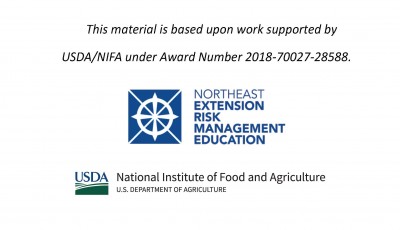The Importance of Accurately Measuring Your Planted Acreage this Season!
Katelyn Walley, Business Management Specialist and Team Leader
Southwest New York Dairy, Livestock and Field Crops Program

Katelyn Walley-Stoll, Business Management Specialist and Team Leader, Southwest New York Dairy, Livestock and Field Crops Program
As you're headed out to plant this season, keep in mind the importance of accurately measuring and recording your planted acreage! Not only is it important to verify your seeding rates and anticipate your nutrient management needs, but this plays a crucial role in crop insurance for your farm.
Crop insurance is an important part of any risk management portfolio. While it might not be as exciting as driving around in the tractor, it can make all of the difference for your farm's bottom line. But, that difference can be quickly undercut with inaccurate acreage reporting.
How so? Well - if you underreport your planted acreage per unit, you could be artificially improving your crop yields! Great for yield contests, not so great for your insurance benefits. That's because indemnity payments are based off of reported production and reported yields for the total crop. Over report and you'll be paying more than you need to in premiums!
You'll want to record:
- Type of crops that were planted
- How many acres you planted of each crop
- Acres prevented from planting
- Your share you have in those crops
- Location, date planted, insurance unit
- Any and all cultural practices followed of note
The reporting deadline varies by crop, but it's important to note that you can not modify your acreage report after the deadline. You should plan to work with your crop insurance agent (find one here!) to verify, verify, and verify your acreage reports. Keep your copy of your acreage report after signing and filing with your records. Communicating closely with your insurance agent and your local USDA office will be key in keeping accurate planting data to help improve your crop production record accuracy.
This material is based upon work supported by USDA/NIFA under Award Number 2018-70027-28588.
Upcoming Events
Cornell Organic Field Crops & Dairy Conference
March 6, 2026
Waterloo, NY
Farmers, researchers, educators, and agricultural service providers from across the Northeast are invited to the 2026 Cornell Organic Field Crops & Dairy Conference, held Friday, March 6, 2026, from 8:00 a.m. to 4:30 p.m. at the Lux Hotel & Conference Center in Waterloo, N.Y.
Co-hosted by New York Soil Health and Cornell CALS, the annual conference brings together leaders in organic grain, dairy, and livestock systems to share practical tools, new research, and farmer-tested strategies to support resilient and profitable organic production.
NY Pork Producers - 2026 Producer Summit & Annual Meeting
March 13 - March 14, 2026
Hamilton, NY
Join NYPP for the 2026 Producer Summit, where producers of all sizes and production styles will explore marketing, branding, selling pork, and current consumer trends through practical sessions designed to help build demand, connect with customers, and add value to their operations.
Mid Atlantic Grain Conference
March 15 - March 16, 2026
We're excited to share that the 2026 Mid‐Atlantic Grain Fair & Grain Conference is coming March 15-16, 2026 in Pennsylvania! This two-day event brings together farmers, millers, bakers, brewers, distillers, researchers, and grain enthusiasts to learn, connect, and celebrate local grains. These events will be offered at two seperate locations.
Announcements
No announcements at this time.





